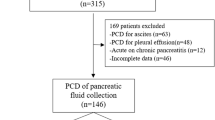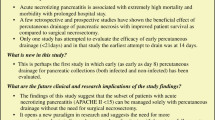Abstract
Background
Percutaneous catheter drainage (PCD) performed pro-actively for collections in acute pancreatitis (AP) is associated with better outcomes. However, there are only a few studies describing this protocol.
Aim
We aimed to evaluate an aggressive PCD protocol.
Methods
Consecutive patients with AP who underwent PCD with an aggressive protocol between January 2018 and January 2019 were included. This protocol involved catheter upsizing at a pre-specified interval (every 4–6 days) as well as drainage of all the new collections. The indications and technical details of PCD and clinical outcomes were compared with patients who underwent standard PCD.
Results
Out of the 185 patients with AP evaluated during the study period, 110 (59.4%) underwent PCD, all with the aggressive protocol. The historical cohort of standard PCD comprised of 113 patients. There was no significant difference in the indication of PCD and interval from pain onset to PCD between the two groups. The mean number of catheters was significantly higher in the aggressive PCD group (1.86 ± 0.962 vs. 1.44 ± 0.667, p = 0.002). Additional catheters were inserted in 54.2% of patients in aggressive group vs. 36.2% in the standard group (p = 0.006). Length of hospital stay and intensive care unit (ICU) stay were significantly longer in the standard PCD group (34.3 ± 20.14 vs. 27.45 ± 14.2 days, p < 0.001 and 10.46 ± 12.29 vs. 4.12 ± 8.5, p = 0.009, respectively). There was no significant difference in mortality and surgery between the two groups.
Conclusion
Aggressive PCD protocol results in reduced length of hospital stay and ICU stay and can reduce hospitalization costs.
Similar content being viewed by others
References
Peery AF, Dellon ES, Lund J, et al. Burden of gastrointestinal disease in the United States: 2012 update. Gastroenterology. 2012;143:1179–1187.e3.
Banks PA, Bollen TL, Dervenis C, et al. Classification of acute pancreatitis—2012: revision of the Atlanta classification and definitions by international consensus. Gut. 2013;62:102–111.
Manrai M, Kochhar R, Gupta V, et al. Outcome of acute pancreatic and peripancreatic collections occurring in patients with acute pancreatitis. Ann Surg. 2018;267:357–363.
Bellam BL, Samanta J, Gupta P, et al. Predictors of outcome of percutaneous catheter drainage in patients with acute pancreatitis having acute fluid collection and development of a predictive model. Pancreatology. 2019;19:658–664.
Mortele K-J, Girshman J, Szejnfeld D, et al. CT-guided percutaneous catheter drainage of acute necrotizing pancreatitis: clinical experience and observations in patients with sterile and infected necrosis. AJR Am J Roentgenol. 2009;192:110–116.
van Santvoort H-C, Besselink M-G, Bakker O-J, et al. A step-up approach or open necrosectomy for necrotizing pancreatitis. N Engl J Med. 2010;362:1491–1502.
Besselink M-G, van Santvoort H-C, Nieuwenhuijs V-B, et al. Minimally invasive ‘step-up approach’ versus maximal necrosectomy in patients with acute necrotising pancreatitis (PANTER trial): design and rationale of a randomised controlled multicenter trial [ISRCTN13975868]. BMC Surg. 2006;6:6.
Ke L, Li J, Hu P, Wang L, Chen H, Zhu Y. Percutaneous catheter drainage in infected pancreatitis necrosis: a systematic review. Indian J Surg. 2016;78:221–228.
van Baal M-C, van Santvoort H-C, Bollen T-L, et al. Systematic review of percutaneous catheter drainage as primary treatment for necrotizing pancreatitis. Br J Surg. 2011;98:18–27.
Mallick B, Dhaka N, Gupta P, et al. An audit of percutaneous drainage for acute necrotic collections and walled off necrosis in patients with acute pancreatitis. Pancreatology. 2018;18:727–733.
van Grinsven J, Timmerman P, van Lienden K-P, et al. Proactive versus standard percutaneous catheter drainage for infected necrotizing pancreatitis. Pancreas. 2017;46:518–523.
Sugimoto M, Sonntag D-P, Flint G-S, et al. Better outcomes if percutaneous drainage is used early and proactively in the course of necrotizing pancreatitis. J Vasc Interv Radiol. 2016;27:418–425.
Sugimoto M, Sonntag D-P, Flint G-S, et al. A percutaneous drainage protocol for severe and moderately severe acute pancreatitis. Surg Endosc. 2015;29:3282–3291.
Hollemans R-A, Bollen T-L, van Brunschot S, et al. Predicting success of catheter drainage in infected necrotizing pancreatitis. Ann Surg. 2016;263:787–792.
Gupta P, Rana P, Bellam BL, et al. Site and size of extrapancreatic necrosis are associated with clinical outcomes in patients with acute necrotizing pancreatitis. Pancreatology. 2020;20:9-15.
Kohli P, Gupta V, Kochhar R, Yadav TD, Sinha SK, Lal A. Lavage through percutaneous catheter drains in severe acute pancreatitis: Does it help? A randomized control trial. Pancreatology. 2019;19:929–934.
Werge M, Novovic S, Roug S, et al. Evaluation of local instillation of antibiotics in infected walled-off pancreatic necrosis. Pancreatology. 2018;18:642–646.
Funding
None.
Author information
Authors and Affiliations
Corresponding author
Ethics declarations
Conflict of interest
The author declares that they have no conflict of interest.
Informed consent
Procedural informed consent was obtained from all individual participants included in the study.
Additional information
Publisher's Note
Springer Nature remains neutral with regard to jurisdictional claims in published maps and institutional affiliations.
Rights and permissions
About this article
Cite this article
Gupta, P., Gupta, J., Kumar, C. et al. Aggressive Percutaneous Catheter Drainage Protocol for Necrotic Pancreatic Collections. Dig Dis Sci 65, 3696–3701 (2020). https://doi.org/10.1007/s10620-020-06116-6
Received:
Accepted:
Published:
Issue Date:
DOI: https://doi.org/10.1007/s10620-020-06116-6




